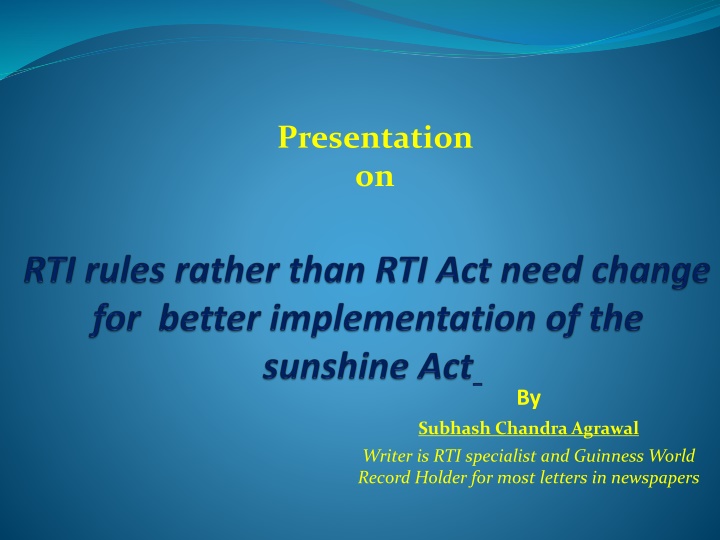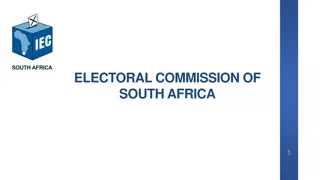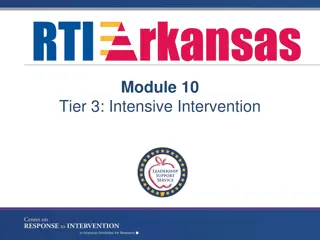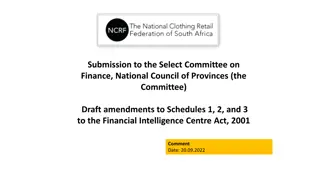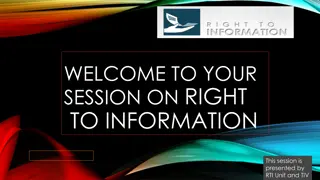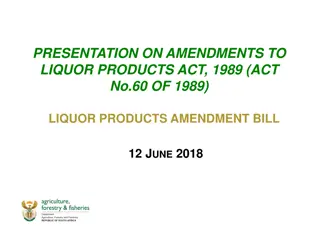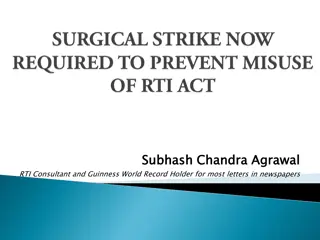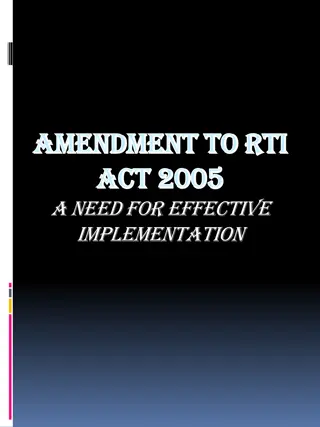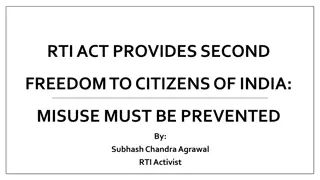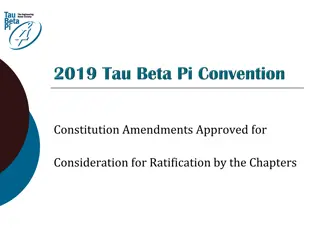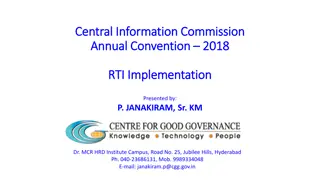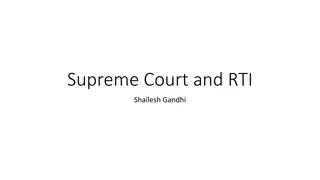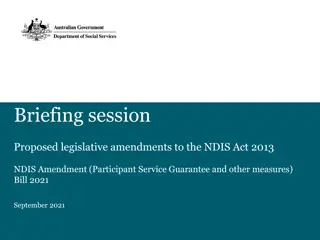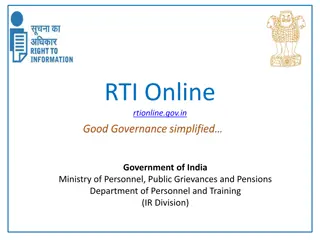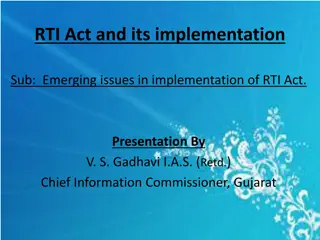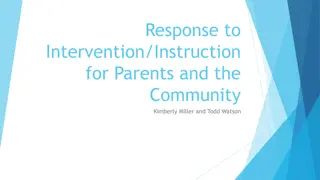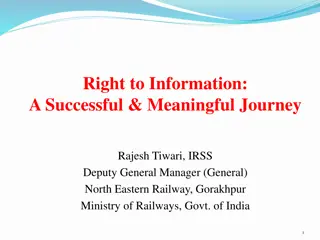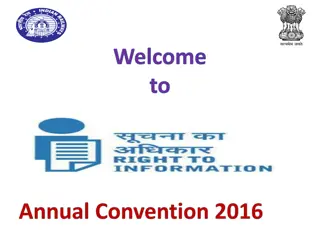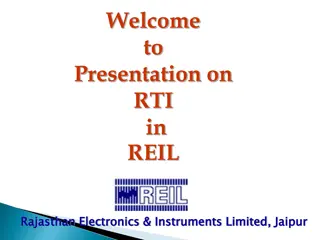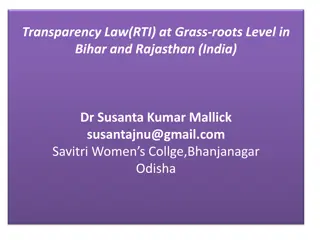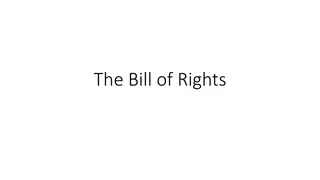Insights into the Indian RTI Act and Proposed Amendments
Subhash Chandra Agrawal, a renowned writer and Guinness World Record holder, sheds light on the Indian Right to Information (RTI) Act of 2005. He discusses the Act's significance in promoting transparency and democracy, highlighting proposed amendments that could impact the autonomy of Information Commissions. Agrawal emphasizes the need for careful deliberation on amendments to uphold the Act's integrity and effectiveness.
Download Presentation

Please find below an Image/Link to download the presentation.
The content on the website is provided AS IS for your information and personal use only. It may not be sold, licensed, or shared on other websites without obtaining consent from the author.If you encounter any issues during the download, it is possible that the publisher has removed the file from their server.
You are allowed to download the files provided on this website for personal or commercial use, subject to the condition that they are used lawfully. All files are the property of their respective owners.
The content on the website is provided AS IS for your information and personal use only. It may not be sold, licensed, or shared on other websites without obtaining consent from the author.
E N D
Presentation Transcript
Presentation on By Subhash Chandra Agrawal Writer is RTI specialist and Guinness World Record Holder for most letters in newspapers
Preliminary Right-To-Information (RTI) Act introduced in the country in the year 2005 is one such legislation passed by Parliament of world s largest democracy, that bypassed all other Acts in terms of fast-gained popularity Presently ranked fourth best of such transparency Acts in the world, Indian RTI Act is virtually best in the world because first three best-ranked such Acts are there in countries which have quite less population just in lakhs while our Act covers population of 130 crores .
Proposed amendments were dangerous for autonomy of Information Commissions There were news-items in past few months that the Central government might amend the wonder-Act by seeking control over the tenure, salary and allowances of Information Commissioners. Service-terms of Central Information Commissioners are at par with those of Election Commissioners, which in turn are at par with those of Supreme Court judges thus Central Information Commissioners are at par with Supreme Court judges. Factually speaking, all holding top posts in legislature, higher judiciary and bureaucracy including even President of India should have a maximum pay-scale and service-conditions equivalent to highest paid bureaucrat thus abolishing need for separate legislations for revision of pay-structure of President, Vice President, state-Governors and judges or their equivalents. If service-conditions are to be changed, then it should be at root-level of Supreme Court judges. If Central government considered any such move improper, then it should have courage to strike down at root-level of Supreme Court judges rather than targeting Central Information Commissioners through proposed amendment in RTI Act.
Otheramendments mooted or needed in RTI Act Another amendment was once mooted for keeping political parties out of purview of RTI Act after historical full-bench CIC- verdict of 03.06.2013 holding six national political parties under purview of RTI Act. But as per news-reports, the then central government avoided any such amendment because the then Attorney General of India is said to have expressed opinion that any such amendment might be struck down by the courts. However certain amendments though needed in the RTI Act like repeal of often misused sections 27 and 28 of RTI Act giving powers to concerned governments and competent authorities to frame their own rules including fixing of RTI fees are not being pressed because few such necessary amendments could pave way for even undesired amendments for diluting RTI Act, 2005. It is good that now Supreme Court has fixed an upper limit of rupees 50 as RTI fees. Necessary changes in rules through consensus of all states and competent authorities can ensure uniformity in RTI rules without amending RTI Act to repeal sections 27 and 28 of RTI Act. RTI Act should be based on basic principle of One Nation One Rule.
Legal assistance to petitioners Ever since Central Information Commission has ceased to be a party in writ-petitions filed against CIC-verdicts at courts, normal petitioners usually have no legal support to contest court-cases, thereby resulting in judgements quashing even the well-thought CIC-verdicts. There are several such examples including at Supreme Court especially in respect of enhancing scope of exemption of section 8(1)(j) relating to personal information. Central Information Commission should provide all legal assistance free-of-cost including for lawyers appearing in court-cases where CIC-verdicts are challenged by public- authorities. CIC can approach leading advocates who may even provide free legal aid in such matters.
Section 4(1)(b) of RTI Act Study reveals that number of RTI applications can be reduced to 50-70 percent if there is complete compliance of section 4(1)(b) of RTI Act regarding sue-motto disclosure of certain information on website. Even Prime Minister in his speech on 16.10.2015 at annual convention of Central Information Commission held at Vigyan Bhawan (New Delhi) and on 06.02.2018 at formal inauguration of CIC-building stressed for the same when he stressed for digitalisation of records. But most public-authorities have been unable for a full compliance of this important section. Successive DoPT circulars like the one of 15.04.2013 issued later have further widened scope and parameters of section 4(1)(b) Complexity of section 4(1)(b) can be reduced by reducing information-points required to be disclosed sue-motto on website. DoPT should make a thorough study of section 4(1)(b) and subsequent circulars, and pin-point some important parameters to be disclosed in a time-bound manner. Healthy competition amongst public-authorities and their heads can be developed for best compliance of section 4(1)(b) of RTI Act by instituting awards and public-praise for motivation of others.
Justice-Delivery-System biggest obstacle in RTI Act There are numerous cases not only at High Courts (mainly Delhi High Court) but also at Supreme Court where cases filed against CIC-verdicts are lying stayed now for dcades with adjournments after adjournments making the proverb Justice delayed is Justice denied now also defined as Information Delayed is Information Denied . This is despite the fact that many Division benches of Supreme Court have repeatedly observed ex-party stay-orders followed by frequent adjournments being the biggest weakness of our Justice- Delivery-System further making remarks that it is quite often that parties initially seek ex-party stay-orders and then take regular adjournments and at times even ultimately losing the case. Honourable Chief Central Information Commissioner of India should write to Honourable Chief Justices of Supreme Court and Delhi High Court for fast disposal of long-pending cases involving CIC-verdicts. Or else, Chief Central Information Commissioner can provide proper legal assistance to concerned RTI applicants for expediting such cases at Supreme Court.
Provision of accepting post-free RTI applications Indian postal-department presently provides facility of receiving post-free RTI applications addressed to central public-authorities at just about 4500 post-offices out of a total of about 160000 post-offices in the country. There can be no operational problem in extending this service at all post-offices of the country, because every posts-office however small it may be, sends a post-bag in the evening to the head post-office. This post-bag sent from each post-office can easily also contain collected RTI petitions to be delivered post-free addressed at central public-authorities. Providing such a facility will prove to be much more effective and useful than on-line filing of RTI petitions in a country where most people especially in rural India are still not using internet.
Introduce RTI stamps in denominations of rupees 2, 10 and 50 CIC s repeated recommendations for introducing exclusive RTI stamps in denominations of rupees 2, 10 and 50 on lines of erstwhile Radio & TV licence-fees stamps should be implemented. Presently most popular mode of remitting RTI fees through postal-orders costs heavily to public-exchequer with handling cost of rupees 39.99 per postal-order as revealed through an RTI response just for postal-department only. There is additional cost on banking-system for clearing- operations involved to get these postal-orders encashed. It is absolutely senseless on part of postal-department to continue bearing such heavy cost on itself by deferring issue of RTI stamps. But when CIC on directions of Chief Central Information Commissioner took the issue administratively after due consideration, Postal-department representative in the committee because of its pre-determined mind to turn down the suggestion of its own interest! Alternate way is to issue serial-numbered postal-coupons in denominations of rupees 2, 10 and 50 but in any case, useless expenditure on handling postal-orders must be avoided. did not include CIC-
No logic in opposing verification of identity of RTI applicants Misuse of filing RTI petitions in name of others or with non- existing persons has become quite common. Copy of ID proof must be made compulsory to be attached with every RTI petition. It is also otherwise necessary because RTI Act does not permit those ex-Indians who later took nationality of some other country. Baseless arguments are being given against the suggestion that it would disclose identity of the RTI applicants! Identity is already disclosed when an RTI applicant has to give his/her name/address in RTI applications to get a reply. It is shocking and surprising that DoPT is ignoring verdict dated 02.11.2012 of Punjab & Haryana High Court in the matter Fruit & Merchant Union vs Unknown (CWP No. 4787 of 2011) where para 23 mentions as under: Further, in all complaints before the Public Information Officer, the appeal before the first appellate authority or any proceedings before the Commission, it should be ensured that the applicant files his proof of identity along with the application. It is for the reason that in some cases, it has come to the notice of this court that the applicants were not identifiable. It would ensure that only the genuine persons file applications.
Include copying-charges of first 20 copied pages in basic RTI fees Nominal RTI fees of rupees ten was fixed thirteen years back. Every government-fees and service-cost has increased manifold in these years like say for cost of railway platform-ticket. It is time that a standard RTI fees of rupees 50 as suggested to be maximum by Supreme Court may be uniformly fixed which may include copying charges for first 20 copied pages. It will in fact turn to be economical in terms of man-hours spent and postal-charges for both the public-authorities and genuine RTI applicants and in demanding and remitting copying-charges. It is significant that RTI fees and copying charges are totally waived for persons below-poverty-line (BPL). However since big contractors file RTI petitions in name of casual labourers of BPL category to get copied documents free-of-cost, provision of free providing of copied documents for people in BPL category can be replaced by offer of inspection of records with copies of documents then provided if information affects the concerned petitioner of BPL category which should be present during inspection of records.
Abuse of RTI Act Some public-authorities are in habit of misusing section 6(3) of RTI Act by unnecessarily transferring hundreds/thousands offices even though information might exist with the transferring public-authority itself. For example, various wings of Union Ministry of Urban Development (MoUD) in the earlier UPA regime had adopted clever tactics to avoid uncomfortable RTI queries like status of government-bungalow number 6, Krishna Menon Marg (New Delhi), change in bungalow-number to 6-A from 8 at Krishna Menon Marg (New Delhi) etc RTI petitions to CPWD responses usually never carried names and contact-details of CPIOs and Appellate Authorities. CPWD website also never carried such details. Even first appeals filed are at times used to be decided by CPIO himself against basics of legal provisions. First appeals used to be dismissed even overlooking appellant s submission to decide these on merit on basis of written submissions without requiring presence of appellants. Likewise Income Tax Department (Headquarters) transferred an RTI petition to thousands of Income Tax Offices across the country where information was sought about those Non-Government-Organisations (NGOs) and political parties which are entitled for tax-exemption under Income Tax Act.
Regular RTI-workshops It may be that many departments/public-authorities might be doing so because of lack of RTI-training. Regular RTI-workshops should be conducted for officers of various public-authorities so that they may not waste man- hours and resources by such large-scale transfer of a single RTI applications to hundreds/thousands authorities. of other public- Since DoPT has not taken adequate steps for training to deal with RTI applications, Central Information Commission should take the challenge by preparing a panel of RTI experts including former Central Information Commissioners which on demand of public-authorities can hold RTI workshops for benefit of public-authorities.
Over-transparency in putting RTI responses on websites DoPT in the year 2014 required public-authorities to put on their websites, scanned copies of all the RTI applications received and their respective responses. Perhaps motto might have been to reduce necessity of filing RTI applications with a view that prospective RTI applicant may get in information in form of scanned response of some earlier RTI application on website. On the contrary, misusers filing RTI applications under fake names and incorrect address find opportunity to file first appeals to further harass public-authority even though mailing-envelope having RTI response is received back undelivered with postal-authorities making remark about name and address of addressee not traceable. Miscreant files first appeal by seeing the scanned RTI response put on website! It is better to eliminate unnecessary spent of resources of public-authorities in scanning etc on an aspect which mainly benefits miscreant elements misusing RTI Act.
Delhi Right To Information Act 2001 lost relevance: Should be repealed Before enactment of Right To Information Act 2005 at national level in the year 2005, Delhi got its own Delhi Right To Information Act 2001 four years ago in the year 2001. Even after losing its relevance after enactment of the national Act, Delhi Right To Information Act 2001 is still in existence even though there may not be much users of this Act because Right To Information Act 2005 is much better drafted for information-seekers. It is time that Delhi Right To Information Act 2001 may now be repealed.
Pro-active disclosure by private sector Central Chief Information Commissioner in a media-interview indicated that Central Information Commission is deliberating on a mechanism for pro-active disclosures by private entities involved in public-work. Statement comes after the CCIC in a verdict noted that even though four million candidates appear every year for examinations conducted by Institute of Banking Personnel Selection (IBPS), it is not a public-authority under RTI Act. There are many other bodies under private-public-partnership (PPP), cooperative-sector, sports-bodies and others which even though declared public-authorities by Central Information Commission, are evading the provision by getting stay-orders on CIC-verdicts from courts. Even cooperative-giant IFFCO gifting properties worth hundreds of crores to its office-bearers out of profits minted through annual fertiliser-subsidies worth tens of thousands of crores is not a public- authority under RTI Act. This convention is an appropriate forum for making recommendations to Honourable Prime Minister for inclusion of all PPPs, sports-bodies, cooperative-societies and other such bodies affecting lives of millions like IBPS to be directly under RTI Act to avoid chances of stay-orders on CIC- verdicts obtained after much efforts.
Wrong perception about governments interfering in working of Information Commissions Perception is being created that retired bureaucrats appointed as Information Commissioners requirements of appointing political rulers. work according to If it would have been so, CIC-verdicts would not have been challenged in courts. It is also contended that retired bureaucrats appointed as Information Commissioners favour departments where they served as bureaucrats. But there is other aspect also when retired bureaucrats as Information Commissioners order on basis of their own experience of wrong-doings in those departments. I remember once the then Chief Information Commissioner who was earlier DoPT Secretary commented on arguments put by DoPT officers during a CICV-hearing before him that do not try to mislead me because I as Secretary at DoPT am very well aware of about functioning of the Department.
